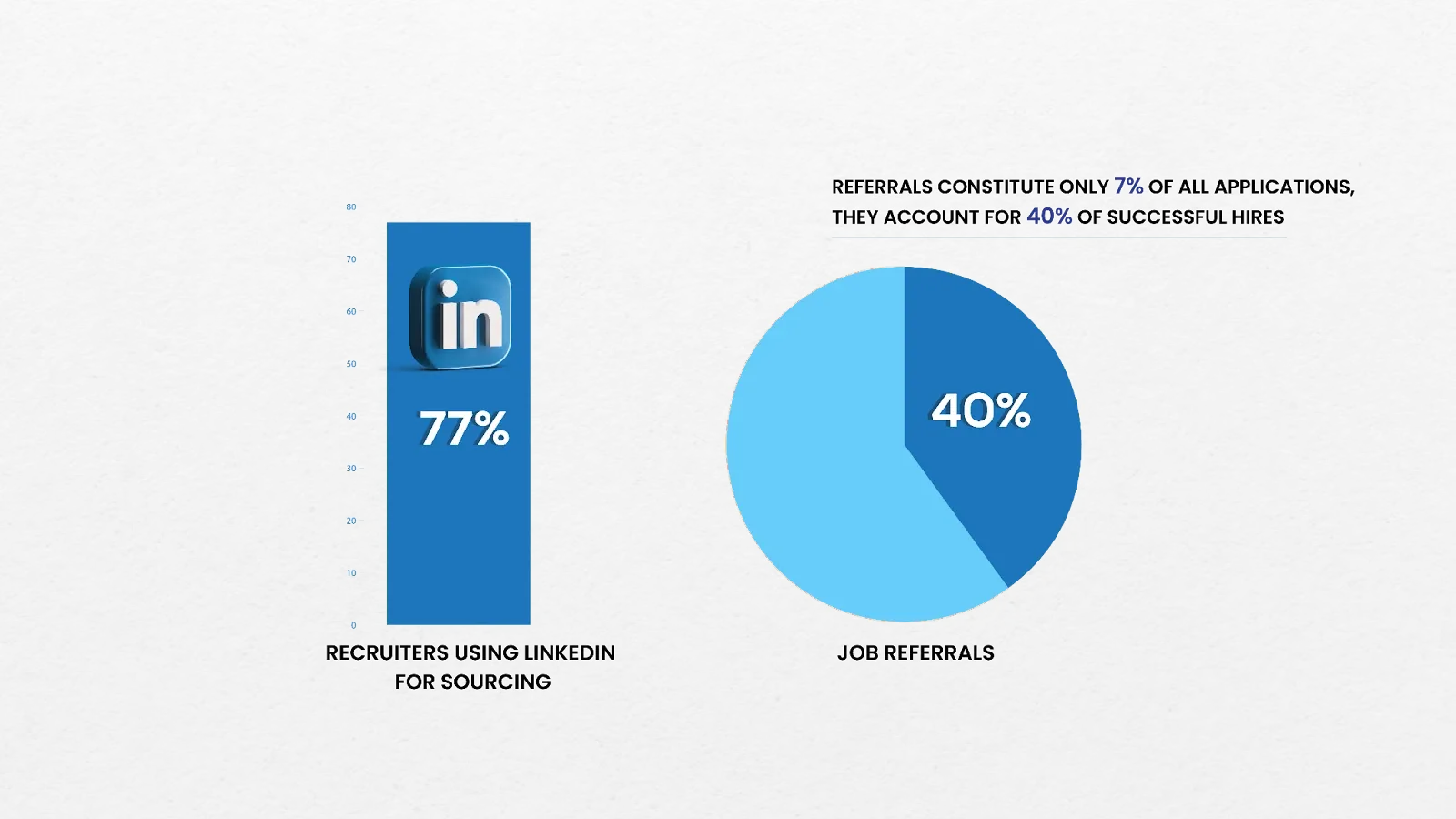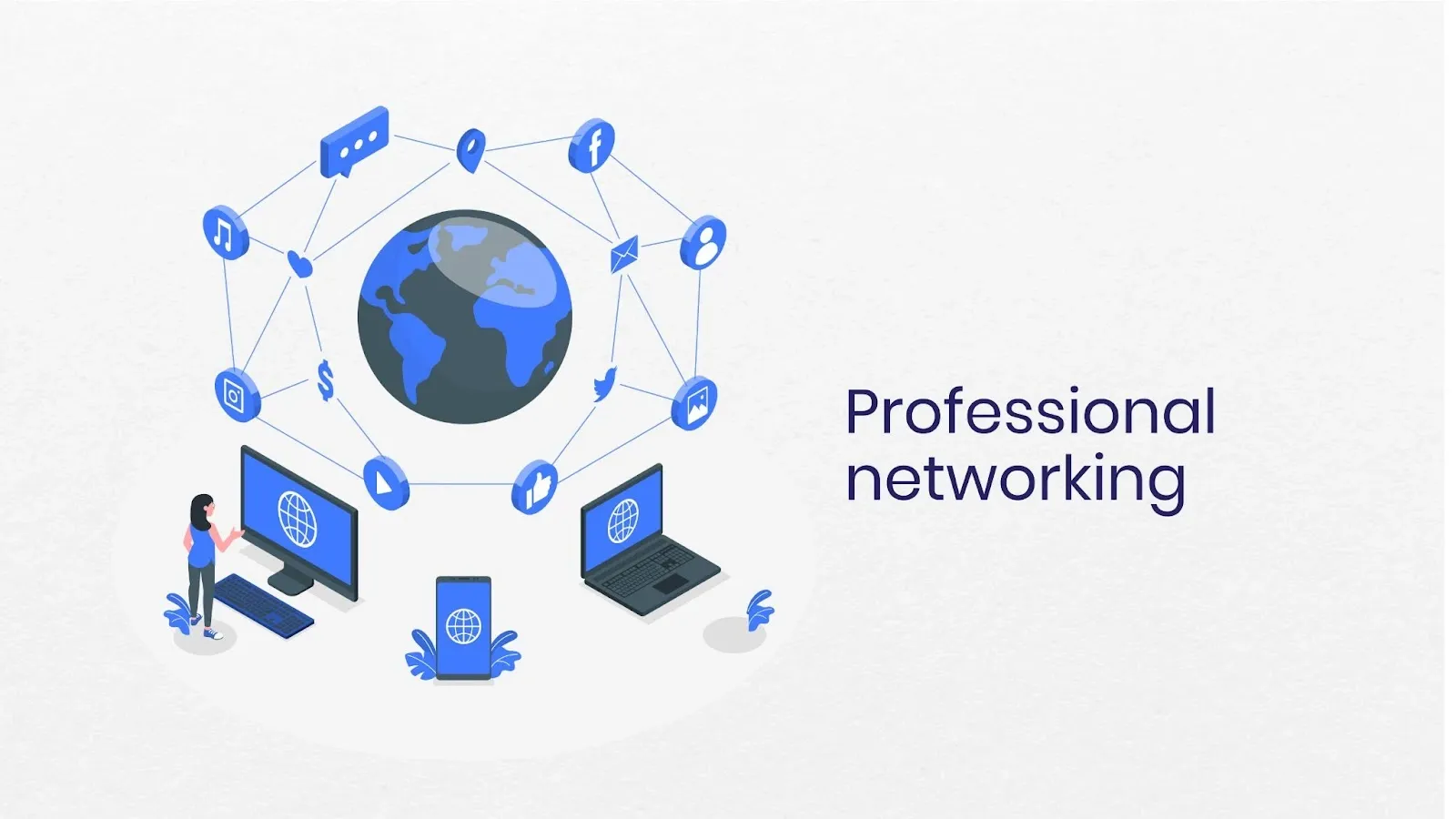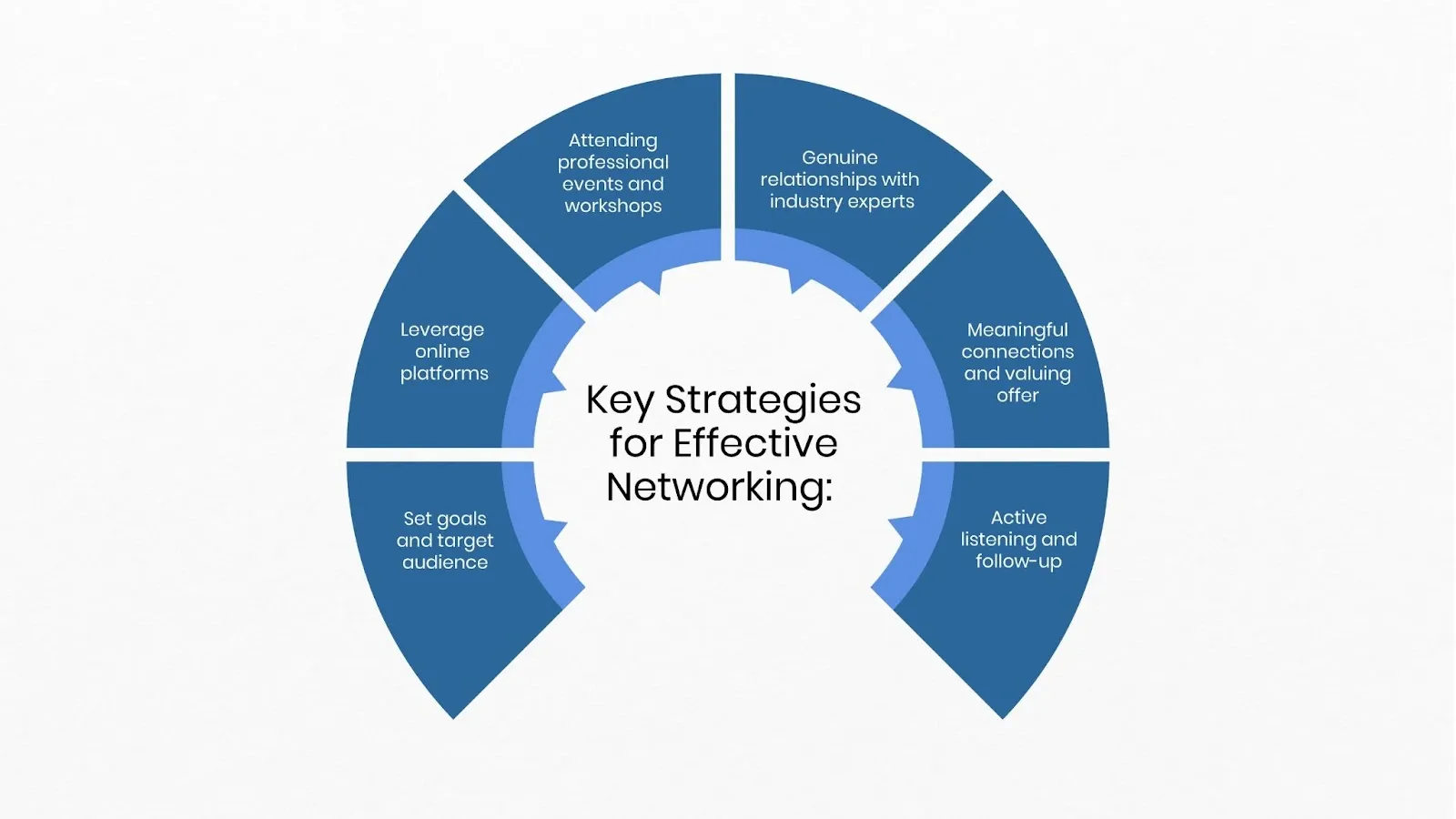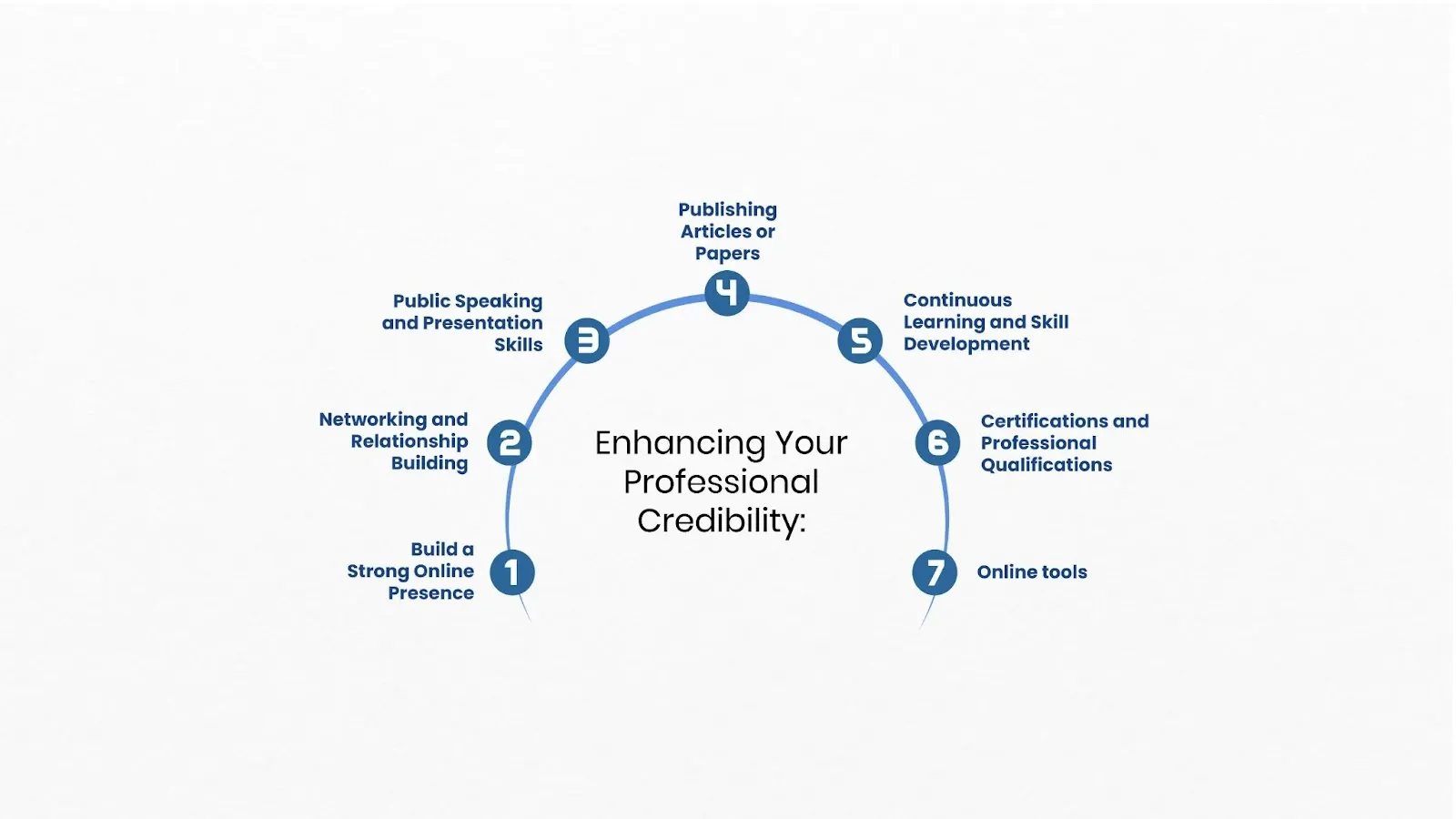Top Professional Networking Strategies for Modern Professionals

Listen up, job hunters and hiring heroes! Networking isn't just a dusty old Rolodex anymore. It's the secret sauce for landing your dream gig (or finding the perfect candidate, recruiters!). Buckle up because I'll drop some stats that'll blow your mind.
77% of recruiters, yeah, SEVEN-SEVEN PERCENT, stalk LinkedIn like it's their social media soulmate. So, if you're not polishing your profile like a shiny new sports car, you're missing out big time.
Building genuine connections there, not just spamming everyone with "Congrats on the promotion!" is your key to unlocking career doors.
And here's the kicker: referrals might only account for 7% of applications, but they snag a whopping 40% of the hired folks! That's like the ultimate shortcut to skipping the endless job-hunting maze. So, schmooze up those industry peeps, get their names out there, and watch the interview invites roll in like tumbleweeds in a Western movie.
Networking ain't just small talk and stale sandwiches anymore. It's your secret weapon for career domination. So, get out there, shake some hands, and make those connections count! Trust me, your future self will thank you for it.

Today, robust professional networks are no longer a luxury but a necessity.
This is more evident on LinkedIn, where a staggering 4 out of 10 posts are related to layoffs. This alarming number underscores the crucial role of professional networking and how these networks play in navigating career challenges.
For those facing the prospect of layoffs or seeking a career change, a well-cultivated network can be a lifeline. It can provide access to job leads, industry insights, and valuable recommendations, making the transition smoother and less daunting.
Nearly half of all LinkedIn posts are related to layoffs.
Forget the endless LinkedIn connections - true professional networking goes beyond mere numbers. It's about building genuine relationships and fostering trust. In a world where 40% of posts are about layoffs, this network could be your lifeline.
Developing your professional network for sustaining in such a highly competitive and dynamic working environment is essential. So, in this blog, you will explore professional Networking and how it will help you in career advancement. Also, you will explore some key Networking strategies for building connections.
Professional Networking

Professional Networking involves forming and developing connections with people in your industry or related fields to enhance your career, construct business development, and support your professional growth. This process involves engaging with co-workers, peers in the industry, mentors, and various professionals to exchange information, share expertise, and uncover new opportunities.
Professional Networking can occur in various environments, such as industry-specific conferences, seminars, workshops, alum gatherings, and through social media channels like LinkedIn.
Even informal settings like local meetups or community events are considered. In this digital era, online Networking has gained significant importance. It has enabled professionals to connect with a worldwide network and expand their professional reach.
Here are some benefits of building a professional network in such a dynamic working environment:
- Access to job opportunities
- Provide industry insights for a better understanding
- Provide advice and mentorship for job seekers
- Helps in building career Networking opportunities
- Building professional reputation
Key Strategies for Effective Networking

Professional Networking requires extra effort when it comes to career development. While connecting with people, one should understand whether the interaction will be helpful for any career advancement. People always use some protocol, which can be called Networking strategies.
These Networking strategies help an individual align their actions and interactions with their career developmental goals, So here are some key Networking strategies for one to follow:
- Set goals and target audience: Having clear objectives before attending Networking events or contacting new contacts is essential. Understand what you want to achieve - finding a job, seeking advice, or expanding your professional circle.
You can strategically approach Networking by identifying your goals and your target audience. This approach ensures that your time and effort in Networking align with your personal and professional objectives. It will lead to more meaningful and beneficial connections.
- Leverage online platforms: Platforms like LinkedIn can be powerful tools for Networking. Sharing relevant content, engaging with others ' posts, and joining industry groups will increase your visibility and connections. Participate in LinkedIn groups or industry-specific forums.
Engage in discussions, share insights, and ask thoughtful questions. This can help establish you as a knowledgeable player in your field.
- Attending professional events and workshops: These events bring together people from the same or related industries. It's an opportunity to meet peers, industry leaders, and potential mentors with similar professional interests and goals. Conferences and workshops often focus on your field's latest trends, skills, and knowledge. Participating in these events enhances your professional skill set and keeps you updated with industry developments.
- Genuine relationships with industry experts: This approach emphasizes building authentic, meaningful connections rather than accumulating contacts. Real relationships often lead to long-term support and guidance, which can be invaluable in your career.
When relationships are authentic, there's a higher level of trust. You can rely on these contacts for honest feedback, advice, and assistance.
- Meaningful connections and valuing offer: Effective Networking involves setting clear goals, being authentic, and listening more than speaking. Following up, maintaining contact, offering help before seeking it, and leveraging social media platforms like LinkedIn and Twitter are essential.
Engaging in substantial dialogues and providing value to others is vital while being prepared with a concise and impactful elevator pitch.
- Active listening and follow-up: Active listening includes total concentration, understanding, and responding to what others say, demonstrating genuine interest and value in their opinions.
It's essential to focus on the speaker, acknowledge their points, clarify any misunderstandings, and remember key details from the conversation. Following up promptly after meeting someone reinforces the connection established and exhibits professionalism.
This can be done through a personalized message that references specific points from the initial conversation, offers something of value, suggests a next step for further engagement, and maintains regular contact. These practices strengthen new relationships and lay the groundwork for meaningful, long-term professional connections.
Networking for Career Advancement
By effectively utilizing your network, you can access new job opportunities that might be private. This involves reaching out to your connections, letting them know you’re open to new opportunities, and asking if they know of any openings in their network.
Here are some benefits of Networking explained below to understand how Networking helps in career advancement:
- Better career decisions: Seek guidance and mentorship from experienced professionals within your network who offer valuable advice. Also, share their experiences and guide you in your career decisions. They can help you overcome challenges and offer insights into industry trends and skills required for advancement.
- Better career opportunities: Exploring potential career paths through your network allows you to understand different roles and industries. It will benefit you if you are looking for a career change or to specialize in a particular area.
- Understand Industry: Informational Leveraging your network for informational interviews is a strategic way to gather industry insights. Informational interviews are casual meetings where you learn about someone’s job, career path, and work industry.
- Offer support: Connecting with former colleagues and classmates can be immensely beneficial. These individuals already understand your work ethic and skills, making them great advocates for you in their organizations. They can alert you to opportunities, provide references, and support your career journey.
In summary, Networking is not just about building a list of contacts but about cultivating meaningful relationships that can provide support, information, and opportunities for career advancement.
Enhancing Your Professional Credibility

Professional credibility plays a crucial role in career advancement, too. They help you establish credibility among professionals and get better opportunities in your career. It also helps in building networks with industry experts.
Here are some points explaining how to enhance your professional credibility:
- Build Strong Online Networking: Online Networking could include a well-maintained LinkedIn profile, a professional blog, or contributions to industry forums. Share your knowledge and insights related to your field on online Networking platforms to build a better presence.
- Networking and Relationship Building: Cultivate solid professional connections. Attend industry events, join professional associations, and actively participate in discussions. Building relationships with other professionals in your field can lead to endorsements and recommendations.
- Public Speaking and Presentation Skills: Develop your public speaking and presentation skills. Being able to effectively communicate your ideas and expertise publicly can significantly enhance your professional standing.
- Publishing Articles or Papers: If applicable, writing articles, research papers, or industry-specific publications can establish you as a thought leader in your field.
- Continuous Learning and Skill Development: Stay updated with the latest trends and advancements in your field. Engaging in constant learning through formal education, workshops, webinars, or self-study demonstrates your commitment to your profession.
- Certifications and Professional Qualifications: Obtaining relevant certifications or qualifications can significantly enhance credibility. These credentials show a recognized level of expertise and dedication to your field.
- Online tools: Using modern-day platforms and tools is essential for enhancing professional credibility in today's digital age. This involves being proficient in industry-standard software and technologies relevant to your field. Familiarize yourself with collaborative tools like Slack, Trello, or Microsoft Teams, which are crucial for remote and hybrid work environments.
You can find many online tools available in the market. There are even agencies that help in building professional credibility because everyone understands its importance. However, searching for an agency can be daunting.
So, to save you time and effort, there is a simple yet powerful online tool that will help you set up your professional credibility and assist you in career advancement with the help of its features - getCREDIBLE
getCREDIBLE enhances your Networking capabilities within your professional field by affirming your credibility. It offers a distinctive functionality to digitally display your skills and projects, facilitating authentic peer feedback.
Additionally, getCREDIBLE allows you to document and share your achievements, aiding in developing a digital portfolio, referred to as a 'Slate' in getCREDIBLE's terminology. What sets getCREDIBLE apart is its innovative features:
- Slate: This digital resume is a dynamic showcase of your professional journey.
- AI-Assisted Milestones: Intelligent tools help you highlight and track significant career milestones.
- Feedback System: An interactive platform for receiving and providing genuine professional feedback.
- Digital Slate Creation: A user-friendly tool for crafting and updating your digital portfolio, ensuring it remains current and reflects your professional growth.
Conclusion
Today’s modern professionals need modern Networking strategies. With this blog, you would have understood the importance of professional Networking and how it enhances your career. It not only helps you develop meaningful connections but also helps you get better career opportunities.
Although the process can be challenging and overwhelming, we have introduced getCREDIBLE, one of the finest Networking tools available in the market, to simplify and enhance your experience.
Sign up now.
